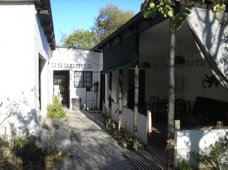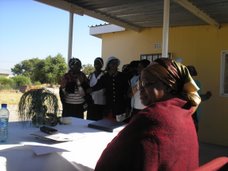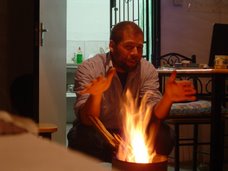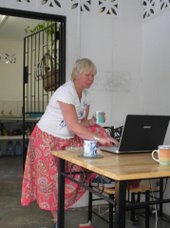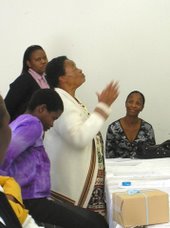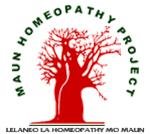As many of you reading this will already know homoeopathy is receiving a lot of bad press in the UK . Not only that, local health authorities are also making it more difficult for people to access homoeopathy through the NHS. This has led to demonstarations in the streets and questions being asked in parliament.
Below are some letters, articles and extracts from Hansard which I have been sent recently regarding the availability of homoepathy on the NHS in the UK. They make interseting reading.
Open letter to Brent Primary Care Trust (PCT)
Demand for immediate restoration of contract with Royal London Homeopathic Hospital (RLHH)
Andrew Parker
Chief Executive
Brent Primary Care Trust
116 Chaplin Road
Wembley, Middlesex
HA0 4UZ
8 March 2007, International Women’s Day
Dear Andrew Parker,
We the undersigned write to express our outrage at the abrupt termination of the contract between Brent Primary Care Trust (PCT) and the Royal London Homeopathic Hospital (RLHH). As patients, carers and other supporters of the hospital, many of us on low incomes (benefits, pensions or low wages), we demand the immediate restoration of this much-valued service to all Brent residents.
Founded in 1849, the RLHH is the oldest homeopathic hospital in the world. There are five homeopathic hospitals in the UK – Bristol, Glasgow, Liverpool, London and Milton Keynes. RLHH is the largest, treating around 2,000 patients per week. In addition to homeopathy, it offers acupuncture and other complementary therapies.
Brent PCT’s decision denies users access to established treatments which are effective and an alternative to conventional medicine, which is often invasive, toxic and expensive.
Many of us stopped conventional treatment in other hospitals after a bad experience and chose to go to the RLHH instead. We have found that it provides a better level of individual care, more sensitive and person-centred than other NHS facilities. As Brent NHS users, we do not want to lose access to the RLHH.
We now find ourselves abandoned in mid-treatment without warning, while others waiting to be seen have had their treatment cancelled, and others still who were counting on using the RLHH in the near future will no longer be able to do so.
Some of us have only just found out that we could have had homeopathic treatment on the NHS; we are angry that the PCT never informed us and we want this option available to us now.
We do not accept that there is insufficient evidence to validate the contract. On the contrary, there is plenty of evidence, not only of demand for homeopathy from NHS users and doctors but of its effectiveness.
1. The demand for Homeopathy on the NHS has increased.
· 43% of PCTs provide access to complementary and alternative medicine (CAM) either wholly or largely free, with acupuncture, chiropractic, homeopathy, osteopathy, therapeutic massage and nutritional therapy being the services most commonly provided.[i]
· The Patients’ Association has called for greater access to complementary medicine on the NHS.[ii]
· 70% of GPs think that some access to complementary medicine should be available on the NHS.[iii]
· One in four members of the public want to see complementary medicine on the NHS.[iv]
· A 2000 Law Lords report lists homeopathy as one of the ‘Big Five’ complementary and alternative therapies, and recommended a more integrated approach to medicine and healthcare with more access to such therapies on the NHS, not less.
· In 2005, 67% of individual GPS and 85% of practices in the Camden PCT area made referrals to RLHH, an increase of 29% over previous years.[v]
· Elsewhere access to complementary and alternative therapies on the NHS is being extended: pilot schemes are planned for Northern Ireland and Wales.
· In Scotland, the Glasgow Homeopathic Hospital has set a standard of patient-centered care of extraordinary beauty and therapeutic value which should be adopted by NHS hospitals everywhere.
We are constantly bombarded with claims that changes to the NHS are based on offering patients choice when in fact choice is constantly undermined. Homeopathy should be available not only to those who can afford to pay for it privately. To do so discriminates against people on low incomes, especially women and people of colour whose average income is lower than white men’s but who happen to be homeopathy’s most likely users.
We launch this letter on International Women’s Day because women are homeopathy’s main users and practitioners. As society’s main carers women provide, unwaged, more healthcare than all the health services of the world put together. We take responsibility for the health and well-being of loved ones – children, partners, parents, friends, neighbours and relatives – from the cradle to the grave, from breastfeeding and daily food provision to nursing and emotional support, often putting our own health last. Those of us with disabilities and long-term ill health are usually seen as the receivers of care, but we often also do caring work for others, especially children and partners. Most complementary and alternative practitioners – as most hospital and other healthcare staff – are also women.
As the key decision-makers on health matters in our families and communities, women want the best for those we care for. We deserve to be consulted, listened to and offered access to treatments which are safe, effective and holistic. PCT’s decision to terminate RLHH’s contract without any consultation, affects women most and is therefore sexist.
The decision dismisses the experiences and wishes of many Brent residents. It is not only women but people of colour[vi] who are more likely to use complementary and alternative therapies, particularly people of Asian descent since homeopathy is one of the main healthcare systems used in the Asian subcontinent. As Brent is one of the most ethnically diverse boroughs in the country with people of colour in the majority, according to the 2001 ONS Census, denying free access to homeopathy in the borough surely amounts to racist discrimination.
We also want to point out that access to complementary and alternative therapies has been shown to help overcome men’s acknowledged reluctance to address health issues.[vii] Why undermine a major provider of such therapies?
Homeopathy is effective.
Homeopathy’s reputation for effectiveness in this country was established beyond doubt during the cholera epidemic of the 1840s. 80% of affected people survived when treated with homeopathy compared to only 20% with conventional treatments.
Recent research confirms the effectiveness of homeopathy for a wide range of illnesses.
· A study commissioned by the Prince of Wales concluded that homeopathy improved conditions such as anxiety, stress and depression, and needed fewer follow up appointments.[viii] It also found that homeopathy could be relatively easily integrated into the NHS and would offer potentially significant cost savings..
· 45% of GPs consider homeopathy useful; 60% of the doctors who use it do so because they have found it effective and due to anxiety about the hazards of conventional treatment. [ix]
· Impact Integrated Medicine Project in Nottingham provided free treatment including homeopathy with funding from the New Deal for Communities (2004 to 2006). Impact’s 2006 Annual Report states that during this time, 87% of patients reported reducing or stopping prescribed medication; 76% saw their GP less, and some no longer required hospital treatment. Impact won the NHS Alliance Acorn Award in 2006, yet funding was not renewed. People can no longer self-refer, but GPs can refer. Demand for Impact’s service is still very high, and 85% of patients who completed a survey reported being very satisfied (www.impact-imp. co.uk).
· Bristol Homeopathic Hospital surveyed what happened to 6,500 patients over six years. 70% reported improvement in their symptoms and well being for conditions which had not responded to conventional treatment.[x]
· A review by an NHS Community Menopause/PMS clinic in Sheffield reports high levels of benefit in reducing menopausal symptoms as well as improved mood and quality of life following homeopathic treatment.[xi]
· RLHH offers care for people with mental health problems. The media recently highlighted the scarcity of services for people suffering from depression. Many doctors acknowledge that prescribing anti-depressants is over-used, often inappropriate and ineffective and has harmful side effects. RLHH users have been referred to alternative treatments which have helped them get off or reduce the use of anti-depressants.
· Waltham Forest PCT has successfully integrated homeopathy into a Mental Health Strategy. This work won the NHS Alliance Acorn Award in 2005.
· The Society of Homeopaths National Service Evaluation found 87% of patients with mental and emotional problems reported positive changes with homeopathy.
· Some of us are volunteers at the Crossroads Women’s Centre in Camden which runs a homeopathic clinic for destitute and low income women, often asylum seekers who have severe health problems as a result of rape and other torture. We have seen great improvements in their health despite their desperate situation.
Homeopathy is safe.
Homeopathy has no side effects or danger of addiction or toxicity. Pregnant women, children, young people and pets can all be treated successfully with it.
Drug based treatment however can lead to effects worse than the original problem. Medical decisions have been found to be the third leading cause of death, and prescribed pharmaceutical drugs are the fourth leading cause of death.[xii] The House of Commons Health Committee highlighted the disadvantages of the increasing use of and reliance on pharmaceutical medicines: “The inappropriate or excessive use … can cause distress, ill-health, hospitalisation and even death.”[xiii]
Homeopathy is cost effective.
Increased use of homeopathy could lead to large benefits and savings to the NHS.
· One homeopathic prescription can cost as little as 16p. Compare that to the £7bn+ the NHS spends each year on conventional drugs.[xiv] The need for many of these drugs is reduced or avoided by homeopathy. Cutting access to the RLHH will cost the NHS more, not less.
· Homeopathy helps prevent ill health. Aside from avoiding side effects and drug dependency which then require further expensive treatments, it can prevent complications associated, for example, with childhood illnesses or childbirth.
· A pilot study showed that doctors practicing homeopathic medicine issue fewer prescriptions and at lower cost than their non homeopathic colleagues.[xv]
· Every £1 spent on promoting health in the workplace can lead to a saving of £2.50 for employers.[xvi] What would the savings if preventative healthcare, such as homeopathy, was promoted in Brent and nationally?
· Despite this cost-effectiveness, NHS investment in complementary medicine is just 0.5% of the NHS budget.
· Most private health companies and many insurance policies consider homeopathic treatment a good investment.[xvii] Why not Brent PCT?
Why is the RLHH under attack?
Why is a therapy which causes no harm constantly under attack when conventional drug treatment which has such a lethal record is not? Most people are aware that the pharmaceutical industry – one of the biggest in the world with the oil and arms industries, with sales of 643 billion dollars of which 17% (109.31 billion dollars) is profit – increasingly dictates the priorities of the NHS. With such massive profits at stake, the pharmaceutical industry has tried to discredit any form of treatment which present an alternative, and therefore poses a threat, to its hegemony. It has tried to discredit homeopathy and GPs who use it by employing ‘Quackbusters’ , many of whom have been exposed as professional litigators with almost no knowledge or experience of the therapies they are paid to attack (www.quackpotwatch. org).
The decision to terminate the contract with the RLHH has nothing to do with health and everything to do with the pharmaceutical industry.
The RLHH belongs to us all.
The Royal Family chooses homeopathy over other forms of healthcare, and people on high incomes who can afford the best increasingly do so. But those of us on low incomes are denied access and have to struggle to pay for what we also consider the best. According to the Society of Homeopaths, the private market for homeopathy is growing at around 20% per year, making it one of the fastest growth sectors in the UK today. Why isn’t this demand reflected in NHS provision?
The RLHH has recently been renovated largely by donations from patients. The legality of denying Brent patients access to a service which they have paid for through National Insurance contributions and donations is being looked into by the British Homeopathic Association.
While the government spends billions on war in Iraq and Afghanistan – bombing, killing, maiming and torturing innocent people against the wishes of the majority of the UK population – it is simultaneously cutting and privatising access to essential holistic, low cost, popular and effective healthcare services such as the RLHH. Instead of cutting access, more patients must be made aware of this service and Brent GPs must be encouraged to refer more people to the RLHH as well as to other registered homeopaths.
The RLHH has always been part of the NHS. This principle of free access to all must remain. We don’t want the RLHH to be only for the Royals!
Signed:
Jenny Hautman (Student homeopath & cancer fighter) and Brent residents:
Niki Adams, Michael Coleman, Cristel Amiss, Sara Callaway, Kay Chapman, Sian Evans, Solveig Francis Giorgio Giandomenici, Selma James, Lisa Longstaff, Nina Lopez, Cari Mitchell, Anne Neale, Sylvia Salley, Anna Thorburn,
Reply to: Solveig Francis c/o Women in Dialogue, PO Box 287, London NW6 5QU
solveig@crossroadsw omen.net
Copy to:
Prince of Wales
The Queen
Sarah Teather MP, Lib Dem, Brent East
Barry Gardiner MP, Labour, Brent North
Dawn Butler MP, Labour, Brent South
Brent Health Select Committee
Local Brent Councillors
Patient Advice and Liaison Service
Healthcare Commission Complaints Investigation Team
The Health Service Ombudsman
Valerie Lawler, Royal London Homeopathic Hospital
[i]. Clinical Governance for Complementary and Alternative Medicine in Primary Care, Final Report to the Department of Health and the King’s Fund, University of Westminster, 2004
[ii] BBC News Online 16 August 2005
[iii] GP magazine, November 2004
[iv] Which? Survey 2003
[v] Alliance for Natural Health, February 2007
[vi] Impact Integrated Medicine Project in Nottingham, Annual Report 2006: 48% of our patients are from Black and Minority Ethnic groups, in an area where the BME population overall is 28%. Interpreters are provided for all patients who do not speak English, so we have been able to work with asylum seekers and refugees, all of whom are dealing with physical and psychological trauma (www.impact- imp.co.uk) .
[vii] Impact Integrated Medicine Project in Nottingham, Annual Report 2006: 38% of our patients are men. As Roger Williams, Nottingham City PCT comments, “You know it’s working when 38% of your patients are men. Men don’t normally get too bothered about their health, but with this they turn out. The feedback has been very good indeed and there are people using Impact who would not usually access the normal service. It’s extremely impressive.” Communities Today magazine, February 2005
[viii] The Role of Complementary and Alternative Medicine in the NHS led by Christopher Smallwood, October 2005
[ix] Dr Magazine, Society of Homeopaths website
[x] Drs David Spence, Elizabeth Thompson and SJ Barron, October 2005, Homeopathic Treatment for Chronic Disease: A 6 year university hospital outpatient observational study, The Journal of Complementary and Alternative Medicine, Vol 11 No 5, 793 -798.
[xi] Relton C, Weatherley-Jones E, May 2005, “Homeopathy service in a National Health Service community menopause clinic: audit of clinical outcomes” in Journal of the British Menopause Society
[xii] Journal of the American Medical Association, Vol 284, July 26, 2000
[xiii] The Influence of the Pharmaceutical Industry, 2005.
[xiv] BBC News 24, 19 February 2007.
[xv] Swayne, Jeremy, 1992, “The cost and effectiveness of homeopathy” in the British Homeopathic Journal Vol 81, pages 148-150.
[xvi] http://www.impact- imp.co.uk
[xvii] Society of Homeopaths
Response from Faculty of Homeopathy to articles in Nature22-03-2007, 11:22 am
The Faculty of Homeopathy, the professional body for doctors who practise homeopathy, disagrees strongly with the assertion that homeopathy is unscientific. There is growing evidence for its clinical effectiveness though more research needs to be done. Universities are just the places to lead this work.
It is untrue that "the evidence against homeopathy is conclusive". On the contrary, despite a lack of funding and research infrastructure for CAM, there are 50 positive (and very few negative) peer-reviewed placebo-controlled trials of homeopathy (1). Most systematic reviews and meta-analyses are positive - this includes comprehensive reviews and those focussed on specific conditions including influenza, arthritis and allergies. "This is far too large a body of evidence to dismiss and warrants further investigation in an open-minded, unbiased spirit of proper scientific enquiry," comments Dr Peter Fisher, spokesman for the Faculty of Homeopathy.
There is also an increasing amount of laboratory research that extends our understanding of how ultra-high dilutions work and shows that homeopathic medicines can exert biological effects (2, 3).
"Patients clearly benefit from homeopathy and doctors, like me, who practise it alongside conventional medicine would not do so if they did not see it working, adds Dr Fisher. "What we urgently need is a more balanced and evidence-based debate, free of the sort of rhetoric coming from Professor Colquhoun and others like him, and proper funding for more well-designed and appropriate research."
1 Full references available on request
2 Belon P, Camps J, Ennis M, et al. (2004).Histamine dilutions modulate basophil activation. Inflammation Research, 53: 181-8
3 Rey L (2003). Thermoluminescence of ultra-high dilutions of lithium chloride and sodium chloride. Phsyica (A). 323: 67-74
> NEWS RELEASE 22nd March 2007> >
"SCIENCE DEGREES WITHOUT THE SCIENCE"> >
The Society of Homeopaths, the UK's largest register of professional homeopaths, supports the conferment of science degrees on graduates of homeopathy courses, strongly refuting the assertion by Professor David Colquhoun in 'Nature' (Vol> 446/22 March 2007) that homeopathy is "anti-science. "
In fact there is considerable evidence demonstrating the clinical effectiveness of homeopathic treatment, including a large outcomes study published in 2005, of an analysis of over 23,000 outpatient consultations at the Bristol Homeopathic Hospital,in which more than 70% reported clinical improvement. (1)
Chief Executive, Paula Ross comments "Colquhoun's attempt to pitch science against what he unhelpfully terms "anti-science" is typical of the sort of reductionist approach that would have science focus only on the known whilst ignoring the presently unknown. What he conveniently chooses to overlook is the fact that homeopathy is a growth area, with thousands of people seeing a practitioner and in excess of £25 million pounds being spent on homeopathy each year. Surely what is needed is more funding and research into exactly how so many people are benefiting from it. And what better section of a university is suited to this task than the science faculty?"
(1) Homeopathic treatment for chronic disease: a six-year> University-Hospital Outpatient Observational Study. Dr. D.S> Spence, Dr. E A Thompson & S J Barron. J. Altern. Complement.> Med. 2005; 11:5:793-798
HANSARD WARNING!!! HANSARD WARNING!!!
What follows is an extract from Hansard, the record of events in both houses of the English parlianment. It's a great thing to read if the matters which are being debated concern the reader. Hence the warning, it can be very dull otherwise. This extract also comes with a warning because it is very long. Arguements in support of homoeopathy have been highlighted to make things easier.
Hansard 26 Oct 2006
Medicines for Human Use (National Rules for Homeopathic Products) Regulations 2006
2.13 pm
Lord Taverne rose to move, That an humble Address be presented to Her Majesty praying that the regulations, laid before the House on 21 July, be annulled (S.I. 2006/1952). [44th Report from the Merits Committee].
The noble Lord said: My Lords, I declare an interest as the chairman of a charity, Sense About Science, which is concerned with the promotion of good science and an evidence-based approach to the public understanding of scientific issues. The statutory instrument which I seek to annul regulates the marketing of homeopathic products. It was laid before Parliament in July this year, a few days before the House rose for the summer Recess, and there has been no opportunity to debate it. It took effect on 1 September.
26 Oct 2006 : Column 1328
Under European law, there was no obligation for the Government to introduce the regulation. EC Directive 2001/83 left it explicitly to nation states to decide how to regulate homeopathy, provided they meet the basic safety requirements of manufactured products. This regulation was made by the Medicines and Healthcare products Regulatory Agency—the MHRA—explicitly for the benefit of the manufacturers of homeopathic products. As the Explanatory Memorandum explains, the law as it stood formerly did not allow new homeopathic products to make claims for therapeutic benefits on their labels and failure to change the law would, in the words of the MHRA,
“inhibit the expansion of the homeopathic industry”.
There was nothing to stop products being sold under what is known as the “simplified scheme” introduced in 1992, but a claim for efficacy could not then be made which was not scientifically tested.
The new regulation, by the way, is concerned solely with homeopathy, not with alternative medicines in general. It has nothing to do with other so-called complementary medicines such as herbal medicines and acupuncture. I mention that because there has been some confusion about it.
There is one very important, absolutely fundamental objection to this regulation. For the first time in the history of the regulation of medical products, it allows claims of efficacy to be made without scientific evidence. It is an abandonment of science and the evidence-based approach. Under this new regulation, the sole basis on which claims of efficacy can be made for homeopathic products quite legally is “homeopathic provings”. There is no need for clinical or scientific tests.
Homeopathy is not based on science and is not a science in any sense whatever. It is a system originally based on two laws proclaimed by the German physician Hahnemann in 1796. The first was that “like cures like”. For this there is no evidence, any more than there is for the medical practice common at the time of suppressing symptoms by the treatment of opposites. However, as treating “like with like” could mean administering a poison, which is not exactly beneficial, he added a second law: the “law of infinitesimals” , which states that the more a substance is diluted, the greater the benefit. Most homeopathic medicines are just about infinitely diluted in water, commonly by 10 to the power of 30—that is, one followed by 30 noughts. What remains is one part in 1 million million million million million. Nothing of the original substance remains.
Not surprisingly, when homeopathic substances have been tested scientifically by double-blind experiments, no evidence has been found that they work any more than as a placebo. This was recently confirmed by a review in the Lancet of more than 100 different studies, which found that there was insufficient evidence that homeopathy is efficacious for any single clinical condition. The mechanism just cannot work. If it does work, it can only be by magic or miracle.
Of course, a placebo can be helpful, because when people believe that something works, it often does—or they get better anyway—but it is the equivalent of witchcraft. Placebos work in odd ways, 26 Oct 2006 : Column 1329however. Injections have been found to work better than pills, and blue pills work better than red ones, except in the case of Italian men. However, dependence on the equivalent of coloured water can be harmful if people who are seriously ill believe in it strongly enough to avoid taking orthodox medicine. Some sellers of homeopathic products also make claims that, if acted on, could lead to serious consequences. Recently, Sense About Science exposed the fact that homeopathic remedies were being recommended against malaria—a very dangerous recommendation indeed.
Evidence-based medicine has brought huge benefits to mankind. It is disgraceful that this regulation rejects the evidence-based approach. It undermines the value of a licensing regime. There is still much public concern about tragedies such as thalidomide, and we have gradually improved the regulation of medicines based on scientific evidence. The Medicines Act 1968 was part of this progress. There have been further improvements since. That is what we have come to expect. Now we get this regulation. It is not surprising that it has come as a shock to the medical and scientific world.
Those who support evidence-based medicine in the strongest possible terms know that what is at issue here is the relationship of trust between the public and drug regulation. At Sense About Science, we have been inundated with expressions of concern. These include comments from the Royal Society, the Academy of Medical Sciences, the Medical Research Council, the Royal College of Pathologists and very many other scientific bodies. Let me read just three of the comments, the first from the British Pharmacological Society. I quote it first because two members of the MHRA, including the chairman, have pharmacological qualifications. The society says:
“The British Pharmacological Society believes that any claim for a medicine must be based on evidence, and that it is the duty of the regulatory authorities, in particular the MHRA, to ensure that no claims can be made for the efficacy of any form of medicine unless there is good evidence that the claim is true. Despite many years of investigation, we have no convincing scientific evidence that homeopathic remedies work any better than placebo”.
Please note that that comes from the chairman of the MHRA, himself a professor of pharmacology.
The Royal College of Pathologists made the following statement:
“For the first time in its history the regulation of medicines has moved away from science and away from clear information for the public. The College is deeply alarmed”.
Thirdly, I quote the Biosciences Federation, which represents just about every relevant professional society in this field and has also expressed its extreme concern. It declared:
“The new regulations do not comply with the MHRA’s duty to ensure safety and efficacy of medicines, and to provide clear, honest advice to the public”.
How can the Government ignore these concerns? How could the MHRA possibly justify this regulation? As the Biosciences Federation points out, the MHRA is in breach of its statutory duties, yet no one from that official body has come forward to defend its regulation since it became clear that there is 26 Oct 2006 : Column 1330a deep concern in all scientific quarters at what it has done. Both on 1 September and this last week all interviews were refused. That in itself is indefensible, since the MHRA is supposed to be accountable and transparent. Anyway, it is not the business of the MHRA to promote homeopathy or, indeed, any other trade or industry. Its declared aims include helping people to understand the benefits and risks of medical products and to communicate reliable information and advice. Are the Government going to rewrite the objectives of the MHRA to include the promotion of industry? I hope that the Minister will answer that point explicitly.
Can we envisage as a next step that the MHRA will weaken the requirements of scientific testing of drugs, because failure to do so would inhibit the expansion of the pharmaceutical industry? As I said, that is the reason explicitly given for this regulation in the case of the homeopathic industry. What it has done is to promote what is in effect the selling of snake oil. This statutory instrument should be withdrawn—it is a disgrace. I beg to move.
Moved, That an humble Address be presented to Her Majesty praying that the regulations, laid before the House on 21 July, be annulled (S.I. 2006/1952). [44th Report from the Merits Committee].—(Lord Taverne.)
The Countess of Mar: My Lords, it was very easy to predict that the noble Lord, Lord Taverne, would pray against these regulations, for his views on homeopathy are well known. I declare my interest in that I use homeopathy for minor ailments and as preventive measures. I see a qualified homeopath if I have something a bit more complex and I see my GP if I feel that I need his intervention. I firmly believe that those of us who do not wish to clog up our doctors’ surgeries with trivial complaints should be allowed to treat them in whatever way we wish so long as we are armed with accurate information.
These regulations are the result of protracted and wide consultation. They iron out existing anomalies whereby homeopathic medicines that existed before 1971 can carry therapeutic indications on their labels while those registered subsequently cannot. The regulations bring homeopathic medicines into line with the 2005 legislation on “traditional- use” herbal medicines. The information provided is required to be accurate.
Homeopathy is widely used by the general public, who will benefit by being able to choose remedies for minor, self-limiting ailments such as nausea, headache, and the common cold. While there have been no clinical trials for over-the-counter remedies such as cough expectorants, and their efficacy is refuted in the March 2006 51st edition of the British National Formulary, homeopathic medicines have been used for more than 200 years and there is wide bibliographic evidence to support their use and effectiveness. They are safe and, unlike many newly developed drugs for which strict testing is required, have never killed anyone. As the noble Lord, Lord Taverne, should know, the first principle of any therapy is, first of all, do no harm.
26 Oct 2006 : Column 1331
The noble Lord complains that homeopathy is not evidence-based. His charity, Sense About Science, claims:
“Evidence-based medicine has been a major public gain of the 20th century”.
I agree that it is essential to protect the public from powerful new drugs, as has been clearly demonstrated by the recent Northwick Park drug trial that nearly killed six healthy young men. But what about the case of the withdrawal of Vioxx, in which the drug, used to treat arthritis, has been estimated to be responsible for between 88,000 and 140,000 extra cases of serious coronary heart disease in the USA?
The evidence base for many conventional medical treatments is still extremely weak. According to the recent British Medical Journal clinical evidence review of 2,404 conventional treatments, only 15 per cent were rated as beneficial, 22 per cent as likely to be beneficial, 7 per cent as a trade-off between benefits and harms, 5 per cent as unlikely to be beneficial, 4 per cent as likely to be ineffective or harmful, and 47 per cent of unknown effectiveness.
Sense About Science claims that homeopathy is not “evidence-based medicine”. This is utterly untrue. Despite a chronic underfunding of research, the effectiveness of homeopathy in many conditions is supported by randomised clinical trials including for childhood diarrhoea, hay-fever, post-operative ileus and osteoarthritis, all of which were the subject of meta-analyses with positive conclusions. It has proved effective with asthma, fibromyalgia, influenza, glue ear, side effects of radiotherapy or chemotherapy, pain, sprains, upper respiratory tract infections and vertigo—each of which has undergone at least two positive randomised control trials—as well as with anxiety, ADHD, CFS, IBS, migraine, PMS, seborrheic dermatitis and tissue trauma, each of which has been the subject of a single randomised control trial with positive results.
In addition, the six-year study at the Bristol Homeopathic Hospital, part of the United Bristol Healthcare Trust and one of five NHS homeopathic hospitals in the UK, published in the Journal of Alternative and Complementary Medicine involved over 6,500 consecutive patients with chronic diseases. All were referred by their GP or hospital specialist and many had tried conventional medicine first. There is a group of patients for whom conventional chemical treatments either do not work or are contra-indicated. Many find homeopathy helpful. Over 70 per cent of the Bristol patients in this study reported positive health changes after homeopathic treatment.
The noble Lord states that the rules for the regulation of medicines should not allow homeopathic products to make unsubstantiated health claims. Two hundred years of bibliographic evidence, provings and traditional use are not unsubstantiated health claims. A proving is a qualitative research study observing and recording the experience of a group of health subjects who experimentally take a particular drug. Contemporary, qualitative, narrative-based research methods, which are becoming increasingly accepted in conventional medicine, are very similar to the techniques used in homeopathic provings.
26 Oct 2006 : Column 1332
It seems extraordinary to me that, when faced with a phenomenon like homeopathy which is shown to work, normally credible scientists discard all the findings of numerous scientists such as Preparata, Del Guidice, Kunio Yasue and Louis Rey. Professor Madeleine Ennis of Queen's University, Belfast, with a large pan-European research team led by Professor Roberfroid of the Catholic University, Louvain, set out to show that homeopathy and water memory were utter nonsense. This was an exercise conducted with extreme scientific rigour. The results obtained were statistically significant. This was put down to human error. Professor Ennis then applied an automated counting protocol to the figures. In the end, she had to concede that high dilutions of the active ingredients in homeopathic solutions worked, whether or not the active ingredient was present in the water. She is quoted as saying:
“The results compel me to suspend my disbelief and to start searching for rational explanations for our findings”.
2.30 pm
As is the way with the establishment that so readily dismisses evidence it does not like, the Royal Society attempted to debunk these results in a BBC2 “Horizon” programme. The experiment appeared on television but the findings were never published in a proper scientific journal, unlike Professor Ennis’s research. The 1994 publication in the Lancet of the results of the double-blind placebo controlled studies conducted by Dr David Reilly in Glasgow, which showed that homeopathy worked for asthma, were accompanied by an editorial comment:
“What could be more absurd than the notion that a substance is therapeutically active in dilutions so great that the patient is unlikely to receive a single molecule of it? Yes, the dilution principle of homeopathy is absurd; so the reason for any therapeutic effect presumably lies elsewhere”.
Perhaps the noble Lord, Lord Taverne, and his Sense About Science friends could be persuaded to suspend their disbelief for a while and, instead of looking for a biochemical answer, look for a nano-pharmacologica l or a bio-physical one. Quantum physics provides a tauntingly fascinating window on life and it may just be that, instead of opposing something that he does not understand, his eyes will be opened to a set of totally new concepts. I remind the noble Lord of a speech he made on 24 June 2004, at col. 323 in Hansard. He might recall that he was critical of radiation safety standards. In advocating the benefits of low doses of radiation he described an effect known as hormesis. The toxicological definition of hormesis is:
“A dose response phenomenon characterised by a low dose stimulation, high dose inhibition, resulting in either a J-shaped or an inverted U-shaped dose response. A pollutant or toxin thus has the opposite effect in small doses than in large doses”.
If that is what the noble Lord believes, he should be well on the way to accepting the principles of homeopathy.
I am glad that the Government have agreed to bring in these regulations. The range of products is limited to the treatment of relatively minor, self-limiting conditions. The regulations will bring uniformity to complementary medicinal labelling and provide consumers with informed choice. I ask the Minister to resist the Prayer of the noble Lord, Lord Taverne.
26 Oct 2006 : Column 1333
Lord Turnberg: My Lords, my question for my noble friend the Minister concerns referral to NICE of homeopathic remedies. I should declare my interests as an ex-professor of medicine and ex-president of the Royal College of Physicians.
I can well understand the Government’s desire to try with these regulations to remove some of the confusion that can arise in the public’s mind, given that homeopathic water marketed before 1971 as a remedy could include an indication of what it was meant to treat, while water marketed after that date could be said only to be safe. Now we have the possibility that water that has been subjected to a “homoepathic proving”, in the words of the regulations, can have indications attached. It is unclear to me whether homeopathic proof is simply proof that is so dilute that none of the original is left, or something else. One way to find out is to refer this whole question to NICE so that it can examine it properly. Can I persuade my noble friend to refer homeopathic remedies to NICE?
Then there is the question of reporting of adverse events. That can be best illustrated by the case of homeopathic remedies for malaria, where I understand that patients seen at the Hospital for Tropical Diseases have had their definitive treatments delayed because they have been taking homeopathic remedies. That is a dangerous side effect of homeopathy, albeit indirect: it delays curative treatments. The problem here is that such reports go unreported, either through the adverse events system or through the drug side-effects route. Will my noble friend consider how such potentially dangerous effects of homeopathy can be reported in a systematic way?
Lord Jenkin of Roding: My Lords, I am glad the noble Countess is able to enjoy the benefits of homeopathic remedies, even if she does not know why. I find these regulations very disturbing, as the noble Lord, Lord Taverne, has already outlined. I referred back to Complementary and Alternative Medicine, the report in November 2000 of the Select Committee of this House chaired by the noble Lord, Lord Walton of Detchant. It is, as so many of these reports are, a mine of information and advice. In the summary of recommendations, the committee reported:
“In our opinion any therapy that makes specific claims for being able to treat specific conditions should have evidence of being able to do this above and beyond the placebo effect. This is especially true for therapies which aim to be available on the NHS and aim to operate as an alternative to conventional medicine, specifically therapies in Group 1”.
The House will no doubt be aware that homeopathy was listed by the committee in group 1.
However, looking through the report for greater clarification, I read that: “Many CAM”—that is, complementary and alternative medicine—
“therapies are based on theories about their modes of action that are not congruent with current scientific knowledge. That is not to say that new scientific knowledge may not emerge in the future. Nevertheless as a Select Committee on Science and Technology we must make it clear from the outset that whilst we accept that some CAM therapies, notably osteopathy, 26 Oct 2006 : Column 1334chiropractic and herbal medicine, have scientifically established efficacy in the treatment of a limited number of ailments, we remain sceptical about the modes of action about many of the others”.
It is noteworthy that the Select Committee did not include homeopathy in that list. That report was published six years ago. Has anything changed since then? Would a Select Committee looking at that today have included homeopathy in the list with the other treatments mentioned?
I turn to the question of research. I listened to the noble Countess with great interest. I hope the Minister will be able to confirm or comment upon what she said. The report says in chapter 7, “Research and Development”:
“To conduct research into CAM disciplines will require much work and resources, and will therefore be time-consuming. Hence, we recommend that three important questions should be addressed in the following order:
(i) To provide a starting point for possible improvements in CAM treatment, to show whether further inquiry would be useful, and to highlight any areas where its application could inform conventional medicine—does the treatment offer therapeutic benefits greater than placebo?
(ii) To protect patients from hazardous practices—is the treatment safe?
(iii) To help patients, doctors and healthcare administrators choose whether or not to adopt the treatment—how does it compare, in medical outcome and cost effectiveness, with other forms of treatment?”.
Has this research been done on homeopathy? If so, where, by whom and with what results? Has it been peer-reviewed? I hope the Minister will be able to answer those questions in his reply.
My central objection to the new regulations is that by bending the rules—the reference to “proven” results is quite different from the normal rules about effectiveness and safety—they appear to give an official imprimatur to treatments for which there is no scientific evidence of safety and efficacy. I find that very disturbing, as did the noble Lords, Lord Taverne and Lord Turnberg. I hope the Minister will be able to reassure the House.
Lord Rees of Ludlow: My Lords, the Royal Society, of which I have the honour to be president, believes that all complementary and alternative medicines should be subject to careful evaluation of their efficacy and their safety. All treatments so labelled should be properly tested and patients should not receive misleading information.
There are no great concerns about the safety of homeopathic treatments. What is at issue is their effectiveness. Obviously placebo effects can be powerful, nobody denies that. It is, however, quite different to assert that homeopathic treatments offer benefits beyond a placebo. Indeed, if medicines can really work even when so diluted that barely a single molecule is left, this would entail some fundamentally new scientific principle with amazingly broad ramifications. It would mean that materials like water carry imprints of their past and can remember their history, as it were, in some quite novel and mysterious way. If that were the case, it would have fundamental implications for precise experiments over the whole of science.
26 Oct 2006 : Column 1335
So it seems to me that the burden of proof on homeopathic remedies should actually be higher, not lower, than for conventional ones. Extraordinary claims demand extraordinary evidence. To put it mildly, so-called “homeopathic provings” seem to fall far short of that. That is why I wholeheartedly support what the noble Lord, Lord Taverne, is saying on this issue.
Lord Colwyn: My Lords, patients tend to use complementary medicine as a supplement to orthodox medicine. There is less emphasis on symptoms and the treatment is usually highly individualised. Whether the treatment is herbal, essential oils, acupuncture or homeopathic, it will be influenced by the patient’s personality and lifestyle as much as by the problem that is presented.
Given the massively high levels of iatrogenic disease and morbidity from orthodox treatments, I am astonished that the noble Lord, Lord Taverne, can dismiss homeopathy in such a frivolous manner. He and my noble friend Lord Jenkin imply that homeopathy can be harmful. I sat on the Select Committee to which the noble Lord referred and although I do not have the papers in front of me, I believe we felt that as homeopathic medicines were basically water, they could not be harmful.
Each year in the UK, about 850,000 adverse effects are caused by orthodox medical treatment. I am sorry to say that 120,000 of these are deaths. How can the use of homeopathy compare with this? Where is the logic of dismissing treatment by a homeopathic product which has never directly caused a death and, when analysed, is shown to contain no active ingredient? Is it not unscientific to abandon treatments that are valued and desired by patients or to dismiss treatments that a particular lobby just does not like?
To say that homeopathy is not evidence-based is completely untrue. Despite chronic underfunding, a substantial body of evidence exists to prove the effectiveness of homeopathy. Now is not the time to list them. The noble Countess, Lady Mar, mentioned some and the evidence is available. I went on a course about 15 years ago on the relationship between quantum physics and homeopathy. I probably did not understand a word I was told at the time, but at least there was evidence that the two were linked.
If homeopathic treatments are harmful, why is there almost total absence of any negligence claims to prove the point? Any case against homeopathy must rest on the argument that the most innocuous of practices may be harmful if they prevent the patient from seeking other more appropriate treatment. Despite the persistence of this line of attack and the anecdotal stories we have heard today, there is no firm evidence to support it. The homeopathic approach helps patients for whom conventional treatment has been unsuccessful or has unacceptable side effects.
It is interesting to consider why homeopathy, which of all complementary therapies is probably at most variance with orthodox medicine, should have received sufficient support from the Government to be able to maintain a number of specialised hospitals.
26 Oct 2006 : Column 1336
2.45 pm
The new regulations clear up an anomaly and bring the UK into line with other countries and the 2005 legislation on the traditional use of herbal medicines which allows a herbal product with 30 years’ traditional use to include indications based on information obtained from its long-standing use and experience.
Companies will now be encouraged to register new homeopathic medicines, with the option of reregistering certain existing products, and will be allowed to include information about the treatment and relief of minor, self-limiting conditions based on the use of the product within the homeopathic tradition. The legislation will benefit the ever-growing number of users of homeopathic medicine, and its provisions will encourage growth in the range of products in the market and enhance the consumer’s understanding of their benefits.
Homeopathic medicines have been used for more than 200 years and there is wide evidence to support their use and effectiveness, placebo effect or not—and I have no problem with the placebo effect. They are safe and have never killed anyone, unlike many newly developed drugs for which strict testing is justifiably required. I must resist the Prayer.
Baroness Barker: My Lords, it is always interesting to follow my noble friend Lord Taverne in a debate. I look forward to taking part in debates with him as he is not only an incredibly knowledgeable but a very passionate speaker.
It is important not to lose sight of what we are talking about here. We are talking about remedies for minor self-limiting conditions, such as travel sickness and muscular pain. Most of the orthodox equivalents for those conditions would be over-the-counter medicines, which probably have efficacy rates that are equally contentious.
It therefore seems to me that the principal matter we should address is the extent to which these products are deemed to be safe and the claims that are made about them. I agree with what my noble Lord, Lord Rees, said in his introduction, although perhaps not with his conclusions.
My reading of the order before us is that an extensive process is set out by which product manufacturers are required to demonstrate safety. There is an inherent dilemma in the questions my noble friend Lord Taverne poses to the homeopathic world. While he dismisses their products as being ineffective and not scientifically proven, he then asks for scientific proof. I would imagine that those on the other side of the argument would point out that that is an impossible thing to ask. They cannot, and perhaps do not wish to, prove what they do in scientific terms. I am struck by the extent to which we have to try to keep a sense of equivalence in all of this. The noble Lord, Lord Turnberg, made an interesting point about the extent to which homeopathic remedies might make people present late for conventional treatment. The same accusation might well be levelled against conventional orthodox treatments of a minor nature. That is one of the difficulties we have.
26 Oct 2006 : Column 1337
The principal question I want the Minister to answer is: what would have been the effect on public health and the health of individuals had this measure not been tabled and had the MRHA not set out the requirements that it has? Leading on from that, the key question for all of us is what the consequent marketing authorisations will be for these products. What claims will manufacturers be able to make for them? The phrase “for the relief of” has already been mentioned. That phrase is used by those whose products for treating minor conditions such as flu are of a more conventional nature. I am not sure that they are any more effective.
It is important that we know precisely what the marketing authorisation will be. What statement will manufacturers be able to make as a result of their product meeting the regulations? That issue was mentioned in the papers that we have been given. I note that in the consultation on the regulations there seemed to be a body of opinion that a product which had been through this process could be marketed as an anthroposophic medicinal product. I sincerely hope that that is not the case as that would be highly misleading for the general public. If as a result of going through these processes, a statement can be made that a product is based on homeopathic assessment, that is fair and reasonable. It is accurate and does not claim to be done on a scientific basis.
There is agreement—whether negative or positive—that on balance homeopathy does no harm. Certainly its efficacy is unproven. We need to be sure that the measure does not open the way for product manufacturers to take greater licence than they should on making efficacy claims for products and regarding the basis of those claims. If the noble Lord can answer those questions, I shall be content for the measure to proceed.
Lord McColl of Dulwich: My Lords, as the noble Lord, Lord Taverne, has said, if a patient has faith in a remedy, it is perfectly possible for their symptoms to be relieved, so long as they are not serious. If, in addition, the patient is made happy by that, his immune system will work better. There is good scientific evidence on that.
One of the problems with this whole subject is that it is bedevilled by various organisations putting forward explanations for how these alternative therapies work. I mention acupuncture en passant. There is no doubt that acupuncture works, probably through releasing endorphins. But this business of there being special tracks and of having to insert the needle in special places is not so. You can stick them in anywhere and the effect is still the same. In reflexology you will see a diagram of the foot and various areas described as the lung area, the heart area and various other areas. What a pity that these strange explanations are given. Why do they not say, “If you’re feeling ill and a beautiful young lady comes along and rubs your foot, you will feel better”? That is perfectly acceptable.
Having said that, alternative therapies have been shown to help with diseases such as multiple sclerosis and cancer, as NICE has reported. Homeopathic 26 Oct 2006 : Column 1338remedies have specifically been proved to help women with PMS. Even if homeopathic medicines cannot be proved to be positively effective, at least they do no harm, as has been argued already.
The EU directive, which we were not obliged to enforce, states that, in order to acquire marketing authorisation, a herbal product must have been used in medical practice for at least 30 years, with 15 of those years having been in the EU. This directive covers only products that are taken orally, used externally or inhaled. It has obviously been forgotten that there is another route for medicines, especially in France. Does the Minister have any information on that?
Article 8 requires that the decision to license a medicine is based on the quality, efficacy and safety of the product. The fees for gaining a licence for a product will vary according to the number of active ingredients. As some products contain large numbers of ingredients, this could prove very expensive. How will it be decided which ingredients are active?
Under the directive, the efficacy of traditional herbal medicinal products does not have to be supported using clinical studies. That is a great pity. The pharmacological effects and efficacy must be shown to be plausible on the basis of long-standing use and experience. How will NICE define “plausible”? NICE determines all its decisions on the use of drugs on an analysis of their cost and clinical effectiveness and believes that homeopathic medicines should be treated in exactly the same way as traditional medicines in deciding whether the NHS should provide them to the public. What advice is the Minister now giving to NICE on this aspect?
The Conservatives believe that the NHS should not exclude alternative therapies. If the NHS rules out providing a herbal therapy, it should do so only on the basis of indisputable evidence, as is the case with all other conventional medicines. Equally, if the NHS decides to provide a particular treatment, this should again be done on the back of evidence. We see the most effective route as the cost-clinical effectiveness criteria which NICE employs in the decision-making process on drug regulation and use. We have always said that as long as these remedies have been proven to be safe, they should be available to buy. Consumers are then free to make their own assessment.
Baroness O'Neill of Bengarve: My Lords, I declare an interest as a trustee of Sense About Science. I believe that the public damage in these regulations does not lie in the circulation of homeopathic remedies but in the diffusion of the standard for the evaluation of remedies. It seems to me that NICE is the one body that can arbitrate in this area. I hope that the Minister will respond to the question of the noble Lord, Lord Turnberg, on the role of NICE in this matter.
The Minister of State, Department of Health (Lord Warner): My Lords, one of the great joys of being a Health Minister in this House is that I am treated to a wide range of views. I am often strongly encouraged to support rather conflicting views.
26 Oct 2006 : Column 1339
I shall try to confine my remarks to making clear the Government’s role in the regulation of homeopathic products and explaining the aims of the new national rules scheme, about which there may be some misunderstanding, given the remarks made in the debate. I bow to the professional knowledge of the noble Lord, Lord McColl, on which orifice to use for which medication.
The use of homeopathic products in this country has a long tradition, as a result of which a wide range has been available and regulated in the UK for many years. Homeopathic products have, for example, been available in the NHS since its inception in 1948. Successive Governments have accepted that homeopathy has its place within the range of treatment options available to patients. That is a historical fact. This Government strongly believe that consumers in the UK should be free to make informed choices about their care, and that includes the freedom to choose homeopathic products. Whether such products are supplied and paid for by the NHS is, under current funding arrangements, for local NHS service providers and primary care trusts to decide. That is exactly the same system that was in place when the noble Lord, Lord Jenkin of Roding, was a distinguished Secretary of State for Health.
3 pm
These new regulations flow from new EU medicines legislation, but it is optional to member states whether they bring it in. This Government have chosen to introduce the new scheme because it will improve the regulation of these products in the UK while continuing to support the principle that consumers should have the right to choose to use them if they so wish. Apart from Denmark and France, we are the only EU country so far to have introduced this scheme that will improve the protection of consumers who choose to use such products, and we have acted in patients’ interests, not in the promotion of commercial products.
Because homeopathic products are different from conventional medicines, it is right that they are regulated differently. Their efficacy cannot be demonstrated in the same way as is required for conventional medicinal products to obtain a licence, but that does not mean that homeopathic products should not be available. Having listened to the debate, I am not entirely clear how such products could ever demonstrate efficacy if they were totally banned. That would be a challenging scientific proposition.
The new national rules scheme that this Government have introduced provides an appropriate regulatory scheme that will improve how many current homeopathic products are regulated. The new scheme continues to give consumers assurances of quality of manufacture and of safety and will provide them with better information about the products available. It develops existing arrangements, which involve two types of registration. The first is for homeopathic products that were on the market when the Medicines Act came into force in 1971 which have product licences of right (PLRs). When these products were included in that scheme in 1971, producers were allowed to label their products to say 26 Oct 2006 : Column 1340what they could be used for. Many of those products are still on the market today.
The second regime is called the simplified scheme, which was introduced in 1992, when the EU first produced legislation for homeopathic products. New products coming on to the market since then have had to comply with those EU rules or with all the rules for conventional medicines, which of course would require them to demonstrate efficacy through clinical trials. Homeopathic products clearly could not do that. Moreover, the scheme’s products may not be labelled to say what they are for—that might be a disadvantage for users. In answer to the noble Baroness, Lady Barker, those existing regulations would continue if these new regulations were not introduced.
The introduction of the new national rules scheme offers an alternative approach that will bring a number of benefits for patients. First, it will, for the first time since the PLR scheme in 1971, allow homeopathic products to be marketed with information to the consumer about what they can be used for. This will provide better information to the consumer and reduce the risk of confusion. We expect that some products currently authorised under the simplified scheme will be switched because they will, for the first time if they qualify, be allowed to be labelled as suitable for the relief of specified conditions. However, to qualify for authorisation under this scheme, the manufacturer has to show, from literature, that there is a tradition of use of that product for a particular purpose. So an evidence base is being used, although it may not satisfy everyone who has spoken.
Secondly, homeopathic products authorised under the new national rules scheme are required to comply with all aspects of the conventional medicines regime, except the requirement to demonstrate efficacy through clinical trials. That will bring significant benefits: improved assurances of quality in manufacture, safety, the review of information given to consumers, and the requirement to submit regular safety reports to the regulator and to submit to inspections. All those elements should reassure consumers, as the measures will enhance safety for those who choose to use homeopathic products.
Thirdly, and importantly, the new national rules scheme provides a possible regulatory home previously not available when we had only the simplified scheme or a full licence available for the products with product licences of right. The MHRA intends to review all the PLRs in the next seven years to ensure that they are of appropriate quality and safety. The MHRA will allow only products authorised under the new scheme to be labelled as suitable for the relief of minor symptoms or conditions—as the noble Baroness, Lady Barker, made clear—products that you would expect to see available on general sale in, for example, supermarkets.
This measure, while maintaining consumers’ freedom to choose to use homeopathic products, will ensure that such products are better regulated and provide more and better information to the consumer. Furthermore, a mandatory statement will be included in the pack instructing the patient to consult their doctor if symptoms persist. Again, that is a new 26 Oct 2006 : Column 1341measure that directs people towards conventional medicine if there is a problem.
The Advisory Board on the Registration of Homeopathic Products, a committee established under the Medicines Act to advise Ministers on matters concerning homeopathic products, will be instrumental in providing advice on the indications for, and safety and quality of, products registered under the new scheme, and on the review and rationalisation of PLRs. In last year’s review of the medicines advisory committee, the advisory board was given a new and enhanced role to advise the Government directly on matters relating to homeopathy. It is an independent committee whose membership includes homeopathic practitioners, people with a wide range of clinical expertise, including GPs, paediatricians, toxicologists and pharmacists.
The noble Lord, Lord Taverne, suggested that the Government are bowing to commercial pressure from the homeopathic industry in introducing this scheme. This is absolutely not the case. I have had meetings with the homeopathic industry, and I do not think that it sees us in the light that has been described this afternoon.
As I have explained, the Government believe that the new national rules scheme provides a significant opportunity to improve consumer information about the use of homeopathic medicinal products on the UK market while maintaining rigorous control over their quality and safety. That will be welcomed by consumers who choose to use those products for minor conditions or illnesses.
Unfortunately, a number of remarks have been made about the MHRA. It is not in breach of its statutory duties, nor does it promote homeopathic products on behalf of the industry that sells them. Having worked with the MHRA as the Minister responsible for it for two years, I regard it as a distinguished public body that has done a great deal in this country to protect the public through the regulation of medicinal products in a scientific way. The MHRA has a role in not only authorising products on grounds of efficacy, but ensuring that safety and quality standards are maintained. It is not concerned purely with efficacy.
We accept that this scheme does not provide any endorsement of clinical efficacy as happens with conventional medicines. It is not designed to replace the use of more conventional treatments, which is why it is restricted to products for the relief of minor conditions that do not require medical intervention. Central to our policy was the inclusion of a statement in the product literature advising patients to consult their doctor if symptoms persist. I believe that the scheme will enable consumers to make more informed choices about the use of homeopathic products, and the regulatory regime will ensure that standards of quality and safety are maintained in the production and use of homeopathic products.
That stance in no way diminishes the Government’s support for evidence-based medicine or for scientific research into new pharmaceutical products that benefit patients. We have done much as a Government to support science and research, and will continue to do so. Homeopathic products are, 26 Oct 2006 : Column 1342however, in a different category. Provided that such products are safe, properly manufactured and clearly labelled without making false claims, which they will be under the new national rules scheme, patients should not be denied access to them for the conditions to which they relate.
A number of noble Lords, including my noble friend Lord Turnberg, raised the issue of NICE. The Government have no plans to refer homeopathic remedies to NICE at present. I gently draw noble Lords’ attention to the fact that NICE has quite a few things on its plate at the moment, including many potentially life-saving drugs. However, there is nothing to stop the use of the yellow card scheme, authorised under the new national rules scheme, to be applied in respect of adverse effects to homeopathic products, as is the case with conventional medicines.
I believe that this is an area where we have to regulate in the way that we have done but, in our view, we must not deny people the right to use these medicines when they are safe, manufactured to an appropriate quality and properly labelled. These are good regulations that should be on the statute book.
Lord Taverne: My Lords, it would be inappropriate to reply to the various issues raised in this debate, but I must make a few very brief points. The intention of this Prayer is not to ban the sale or diffusion of homeopathic products but to stop regulation that allows claims of efficacy which do not have scientific proof and which encourage people to believe that homeopathy works in a way that cannot be proved. That could have, and has had, serious effects in some cases.
I am extremely disappointed by the Minister's reply because he has not denied—indeed, he could not deny—that these regulations turn their back on the entire history of the regulation of medical products in which such products have been scientifically proved. Nor did he answer the question about the interests of the homeopathic industry—indeed, he denied that the regulations had anything to do with that.
Perhaps I may read the appropriate sentence from the Explanatory Memorandum attached to these regulations:
“Although the development of national rules ... under the ... Directive is optional, failing to introduce the scheme would inhibit the expansion of the homeopathic industry”.
If that does not mean that the purpose of the regulations is to assist the homeopathic industry, I do not know what it means.
I should also like the Minister to look again at the whole role of the MHRA, which has now abandoned its purpose of guaranteeing the safety and, in particular, the efficacy of its products.
I am afraid that the noble Lord’s reply will not reassure the numerous—in fact, almost comprehensive— list of medical bodies that have expressed extreme concern at the MHRA’s change of tack. His reply was feeble, and I am sorry to say that the reply from my own Front Bench was equally feeble. If they are to be taken seriously, perhaps sometimes they should apply a little intellectual rigour.
26 Oct 2006 : Column 1343
I understand that it is not customary to have a vote on a Prayer of this kind. We shall continue, as I am sure will many others, to press for these regulations to be withdrawn. I hope that the Government will give further thought to them, but I beg leave to withdraw the Motion.
Motion, by leave, withdrawn.
Medicines for Human Use (National Rules for Homeopathic Products) Regulations 2006
2.13 pm
Lord Taverne rose to move, That an humble Address be presented to Her Majesty praying that the regulations, laid before the House on 21 July, be annulled (S.I. 2006/1952). [44th Report from the Merits Committee].
The noble Lord said: My Lords, I declare an interest as the chairman of a charity, Sense About Science, which is concerned with the promotion of good science and an evidence-based approach to the public understanding of scientific issues. The statutory instrument which I seek to annul regulates the marketing of homeopathic products. It was laid before Parliament in July this year, a few days before the House rose for the summer Recess, and there has been no opportunity to debate it. It took effect on 1 September.
26 Oct 2006 : Column 1328
Under European law, there was no obligation for the Government to introduce the regulation. EC Directive 2001/83 left it explicitly to nation states to decide how to regulate homeopathy, provided they meet the basic safety requirements of manufactured products. This regulation was made by the Medicines and Healthcare products Regulatory Agency—the MHRA—explicitly for the benefit of the manufacturers of homeopathic products. As the Explanatory Memorandum explains, the law as it stood formerly did not allow new homeopathic products to make claims for therapeutic benefits on their labels and failure to change the law would, in the words of the MHRA,
“inhibit the expansion of the homeopathic industry”.
There was nothing to stop products being sold under what is known as the “simplified scheme” introduced in 1992, but a claim for efficacy could not then be made which was not scientifically tested.
The new regulation, by the way, is concerned solely with homeopathy, not with alternative medicines in general. It has nothing to do with other so-called complementary medicines such as herbal medicines and acupuncture. I mention that because there has been some confusion about it.
There is one very important, absolutely fundamental objection to this regulation. For the first time in the history of the regulation of medical products, it allows claims of efficacy to be made without scientific evidence. It is an abandonment of science and the evidence-based approach. Under this new regulation, the sole basis on which claims of efficacy can be made for homeopathic products quite legally is “homeopathic provings”. There is no need for clinical or scientific tests.
Homeopathy is not based on science and is not a science in any sense whatever. It is a system originally based on two laws proclaimed by the German physician Hahnemann in 1796. The first was that “like cures like”. For this there is no evidence, any more than there is for the medical practice common at the time of suppressing symptoms by the treatment of opposites. However, as treating “like with like” could mean administering a poison, which is not exactly beneficial, he added a second law: the “law of infinitesimals” , which states that the more a substance is diluted, the greater the benefit. Most homeopathic medicines are just about infinitely diluted in water, commonly by 10 to the power of 30—that is, one followed by 30 noughts. What remains is one part in 1 million million million million million. Nothing of the original substance remains.
Not surprisingly, when homeopathic substances have been tested scientifically by double-blind experiments, no evidence has been found that they work any more than as a placebo. This was recently confirmed by a review in the Lancet of more than 100 different studies, which found that there was insufficient evidence that homeopathy is efficacious for any single clinical condition. The mechanism just cannot work. If it does work, it can only be by magic or miracle.
Of course, a placebo can be helpful, because when people believe that something works, it often does—or they get better anyway—but it is the equivalent of witchcraft. Placebos work in odd ways, 26 Oct 2006 : Column 1329however. Injections have been found to work better than pills, and blue pills work better than red ones, except in the case of Italian men. However, dependence on the equivalent of coloured water can be harmful if people who are seriously ill believe in it strongly enough to avoid taking orthodox medicine. Some sellers of homeopathic products also make claims that, if acted on, could lead to serious consequences. Recently, Sense About Science exposed the fact that homeopathic remedies were being recommended against malaria—a very dangerous recommendation indeed.
Evidence-based medicine has brought huge benefits to mankind. It is disgraceful that this regulation rejects the evidence-based approach. It undermines the value of a licensing regime. There is still much public concern about tragedies such as thalidomide, and we have gradually improved the regulation of medicines based on scientific evidence. The Medicines Act 1968 was part of this progress. There have been further improvements since. That is what we have come to expect. Now we get this regulation. It is not surprising that it has come as a shock to the medical and scientific world.
Those who support evidence-based medicine in the strongest possible terms know that what is at issue here is the relationship of trust between the public and drug regulation. At Sense About Science, we have been inundated with expressions of concern. These include comments from the Royal Society, the Academy of Medical Sciences, the Medical Research Council, the Royal College of Pathologists and very many other scientific bodies. Let me read just three of the comments, the first from the British Pharmacological Society. I quote it first because two members of the MHRA, including the chairman, have pharmacological qualifications. The society says:
“The British Pharmacological Society believes that any claim for a medicine must be based on evidence, and that it is the duty of the regulatory authorities, in particular the MHRA, to ensure that no claims can be made for the efficacy of any form of medicine unless there is good evidence that the claim is true. Despite many years of investigation, we have no convincing scientific evidence that homeopathic remedies work any better than placebo”.
Please note that that comes from the chairman of the MHRA, himself a professor of pharmacology.
The Royal College of Pathologists made the following statement:
“For the first time in its history the regulation of medicines has moved away from science and away from clear information for the public. The College is deeply alarmed”.
Thirdly, I quote the Biosciences Federation, which represents just about every relevant professional society in this field and has also expressed its extreme concern. It declared:
“The new regulations do not comply with the MHRA’s duty to ensure safety and efficacy of medicines, and to provide clear, honest advice to the public”.
How can the Government ignore these concerns? How could the MHRA possibly justify this regulation? As the Biosciences Federation points out, the MHRA is in breach of its statutory duties, yet no one from that official body has come forward to defend its regulation since it became clear that there is 26 Oct 2006 : Column 1330a deep concern in all scientific quarters at what it has done. Both on 1 September and this last week all interviews were refused. That in itself is indefensible, since the MHRA is supposed to be accountable and transparent. Anyway, it is not the business of the MHRA to promote homeopathy or, indeed, any other trade or industry. Its declared aims include helping people to understand the benefits and risks of medical products and to communicate reliable information and advice. Are the Government going to rewrite the objectives of the MHRA to include the promotion of industry? I hope that the Minister will answer that point explicitly.
Can we envisage as a next step that the MHRA will weaken the requirements of scientific testing of drugs, because failure to do so would inhibit the expansion of the pharmaceutical industry? As I said, that is the reason explicitly given for this regulation in the case of the homeopathic industry. What it has done is to promote what is in effect the selling of snake oil. This statutory instrument should be withdrawn—it is a disgrace. I beg to move.
Moved, That an humble Address be presented to Her Majesty praying that the regulations, laid before the House on 21 July, be annulled (S.I. 2006/1952). [44th Report from the Merits Committee].—(Lord Taverne.)
The Countess of Mar: My Lords, it was very easy to predict that the noble Lord, Lord Taverne, would pray against these regulations, for his views on homeopathy are well known. I declare my interest in that I use homeopathy for minor ailments and as preventive measures. I see a qualified homeopath if I have something a bit more complex and I see my GP if I feel that I need his intervention. I firmly believe that those of us who do not wish to clog up our doctors’ surgeries with trivial complaints should be allowed to treat them in whatever way we wish so long as we are armed with accurate information.
These regulations are the result of protracted and wide consultation. They iron out existing anomalies whereby homeopathic medicines that existed before 1971 can carry therapeutic indications on their labels while those registered subsequently cannot. The regulations bring homeopathic medicines into line with the 2005 legislation on “traditional- use” herbal medicines. The information provided is required to be accurate.
Homeopathy is widely used by the general public, who will benefit by being able to choose remedies for minor, self-limiting ailments such as nausea, headache, and the common cold. While there have been no clinical trials for over-the-counter remedies such as cough expectorants, and their efficacy is refuted in the March 2006 51st edition of the British National Formulary, homeopathic medicines have been used for more than 200 years and there is wide bibliographic evidence to support their use and effectiveness. They are safe and, unlike many newly developed drugs for which strict testing is required, have never killed anyone. As the noble Lord, Lord Taverne, should know, the first principle of any therapy is, first of all, do no harm.
26 Oct 2006 : Column 1331
The noble Lord complains that homeopathy is not evidence-based. His charity, Sense About Science, claims:
“Evidence-based medicine has been a major public gain of the 20th century”.
I agree that it is essential to protect the public from powerful new drugs, as has been clearly demonstrated by the recent Northwick Park drug trial that nearly killed six healthy young men. But what about the case of the withdrawal of Vioxx, in which the drug, used to treat arthritis, has been estimated to be responsible for between 88,000 and 140,000 extra cases of serious coronary heart disease in the USA?
The evidence base for many conventional medical treatments is still extremely weak. According to the recent British Medical Journal clinical evidence review of 2,404 conventional treatments, only 15 per cent were rated as beneficial, 22 per cent as likely to be beneficial, 7 per cent as a trade-off between benefits and harms, 5 per cent as unlikely to be beneficial, 4 per cent as likely to be ineffective or harmful, and 47 per cent of unknown effectiveness.
Sense About Science claims that homeopathy is not “evidence-based medicine”. This is utterly untrue. Despite a chronic underfunding of research, the effectiveness of homeopathy in many conditions is supported by randomised clinical trials including for childhood diarrhoea, hay-fever, post-operative ileus and osteoarthritis, all of which were the subject of meta-analyses with positive conclusions. It has proved effective with asthma, fibromyalgia, influenza, glue ear, side effects of radiotherapy or chemotherapy, pain, sprains, upper respiratory tract infections and vertigo—each of which has undergone at least two positive randomised control trials—as well as with anxiety, ADHD, CFS, IBS, migraine, PMS, seborrheic dermatitis and tissue trauma, each of which has been the subject of a single randomised control trial with positive results.
In addition, the six-year study at the Bristol Homeopathic Hospital, part of the United Bristol Healthcare Trust and one of five NHS homeopathic hospitals in the UK, published in the Journal of Alternative and Complementary Medicine involved over 6,500 consecutive patients with chronic diseases. All were referred by their GP or hospital specialist and many had tried conventional medicine first. There is a group of patients for whom conventional chemical treatments either do not work or are contra-indicated. Many find homeopathy helpful. Over 70 per cent of the Bristol patients in this study reported positive health changes after homeopathic treatment.
The noble Lord states that the rules for the regulation of medicines should not allow homeopathic products to make unsubstantiated health claims. Two hundred years of bibliographic evidence, provings and traditional use are not unsubstantiated health claims. A proving is a qualitative research study observing and recording the experience of a group of health subjects who experimentally take a particular drug. Contemporary, qualitative, narrative-based research methods, which are becoming increasingly accepted in conventional medicine, are very similar to the techniques used in homeopathic provings.
26 Oct 2006 : Column 1332
It seems extraordinary to me that, when faced with a phenomenon like homeopathy which is shown to work, normally credible scientists discard all the findings of numerous scientists such as Preparata, Del Guidice, Kunio Yasue and Louis Rey. Professor Madeleine Ennis of Queen's University, Belfast, with a large pan-European research team led by Professor Roberfroid of the Catholic University, Louvain, set out to show that homeopathy and water memory were utter nonsense. This was an exercise conducted with extreme scientific rigour. The results obtained were statistically significant. This was put down to human error. Professor Ennis then applied an automated counting protocol to the figures. In the end, she had to concede that high dilutions of the active ingredients in homeopathic solutions worked, whether or not the active ingredient was present in the water. She is quoted as saying:
“The results compel me to suspend my disbelief and to start searching for rational explanations for our findings”.
2.30 pm
As is the way with the establishment that so readily dismisses evidence it does not like, the Royal Society attempted to debunk these results in a BBC2 “Horizon” programme. The experiment appeared on television but the findings were never published in a proper scientific journal, unlike Professor Ennis’s research. The 1994 publication in the Lancet of the results of the double-blind placebo controlled studies conducted by Dr David Reilly in Glasgow, which showed that homeopathy worked for asthma, were accompanied by an editorial comment:
“What could be more absurd than the notion that a substance is therapeutically active in dilutions so great that the patient is unlikely to receive a single molecule of it? Yes, the dilution principle of homeopathy is absurd; so the reason for any therapeutic effect presumably lies elsewhere”.
Perhaps the noble Lord, Lord Taverne, and his Sense About Science friends could be persuaded to suspend their disbelief for a while and, instead of looking for a biochemical answer, look for a nano-pharmacologica l or a bio-physical one. Quantum physics provides a tauntingly fascinating window on life and it may just be that, instead of opposing something that he does not understand, his eyes will be opened to a set of totally new concepts. I remind the noble Lord of a speech he made on 24 June 2004, at col. 323 in Hansard. He might recall that he was critical of radiation safety standards. In advocating the benefits of low doses of radiation he described an effect known as hormesis. The toxicological definition of hormesis is:
“A dose response phenomenon characterised by a low dose stimulation, high dose inhibition, resulting in either a J-shaped or an inverted U-shaped dose response. A pollutant or toxin thus has the opposite effect in small doses than in large doses”.
If that is what the noble Lord believes, he should be well on the way to accepting the principles of homeopathy.
I am glad that the Government have agreed to bring in these regulations. The range of products is limited to the treatment of relatively minor, self-limiting conditions. The regulations will bring uniformity to complementary medicinal labelling and provide consumers with informed choice. I ask the Minister to resist the Prayer of the noble Lord, Lord Taverne.
26 Oct 2006 : Column 1333
Lord Turnberg: My Lords, my question for my noble friend the Minister concerns referral to NICE of homeopathic remedies. I should declare my interests as an ex-professor of medicine and ex-president of the Royal College of Physicians.
I can well understand the Government’s desire to try with these regulations to remove some of the confusion that can arise in the public’s mind, given that homeopathic water marketed before 1971 as a remedy could include an indication of what it was meant to treat, while water marketed after that date could be said only to be safe. Now we have the possibility that water that has been subjected to a “homoepathic proving”, in the words of the regulations, can have indications attached. It is unclear to me whether homeopathic proof is simply proof that is so dilute that none of the original is left, or something else. One way to find out is to refer this whole question to NICE so that it can examine it properly. Can I persuade my noble friend to refer homeopathic remedies to NICE?
Then there is the question of reporting of adverse events. That can be best illustrated by the case of homeopathic remedies for malaria, where I understand that patients seen at the Hospital for Tropical Diseases have had their definitive treatments delayed because they have been taking homeopathic remedies. That is a dangerous side effect of homeopathy, albeit indirect: it delays curative treatments. The problem here is that such reports go unreported, either through the adverse events system or through the drug side-effects route. Will my noble friend consider how such potentially dangerous effects of homeopathy can be reported in a systematic way?
Lord Jenkin of Roding: My Lords, I am glad the noble Countess is able to enjoy the benefits of homeopathic remedies, even if she does not know why. I find these regulations very disturbing, as the noble Lord, Lord Taverne, has already outlined. I referred back to Complementary and Alternative Medicine, the report in November 2000 of the Select Committee of this House chaired by the noble Lord, Lord Walton of Detchant. It is, as so many of these reports are, a mine of information and advice. In the summary of recommendations, the committee reported:
“In our opinion any therapy that makes specific claims for being able to treat specific conditions should have evidence of being able to do this above and beyond the placebo effect. This is especially true for therapies which aim to be available on the NHS and aim to operate as an alternative to conventional medicine, specifically therapies in Group 1”.
The House will no doubt be aware that homeopathy was listed by the committee in group 1.
However, looking through the report for greater clarification, I read that: “Many CAM”—that is, complementary and alternative medicine—
“therapies are based on theories about their modes of action that are not congruent with current scientific knowledge. That is not to say that new scientific knowledge may not emerge in the future. Nevertheless as a Select Committee on Science and Technology we must make it clear from the outset that whilst we accept that some CAM therapies, notably osteopathy, 26 Oct 2006 : Column 1334chiropractic and herbal medicine, have scientifically established efficacy in the treatment of a limited number of ailments, we remain sceptical about the modes of action about many of the others”.
It is noteworthy that the Select Committee did not include homeopathy in that list. That report was published six years ago. Has anything changed since then? Would a Select Committee looking at that today have included homeopathy in the list with the other treatments mentioned?
I turn to the question of research. I listened to the noble Countess with great interest. I hope the Minister will be able to confirm or comment upon what she said. The report says in chapter 7, “Research and Development”:
“To conduct research into CAM disciplines will require much work and resources, and will therefore be time-consuming. Hence, we recommend that three important questions should be addressed in the following order:
(i) To provide a starting point for possible improvements in CAM treatment, to show whether further inquiry would be useful, and to highlight any areas where its application could inform conventional medicine—does the treatment offer therapeutic benefits greater than placebo?
(ii) To protect patients from hazardous practices—is the treatment safe?
(iii) To help patients, doctors and healthcare administrators choose whether or not to adopt the treatment—how does it compare, in medical outcome and cost effectiveness, with other forms of treatment?”.
Has this research been done on homeopathy? If so, where, by whom and with what results? Has it been peer-reviewed? I hope the Minister will be able to answer those questions in his reply.
My central objection to the new regulations is that by bending the rules—the reference to “proven” results is quite different from the normal rules about effectiveness and safety—they appear to give an official imprimatur to treatments for which there is no scientific evidence of safety and efficacy. I find that very disturbing, as did the noble Lords, Lord Taverne and Lord Turnberg. I hope the Minister will be able to reassure the House.
Lord Rees of Ludlow: My Lords, the Royal Society, of which I have the honour to be president, believes that all complementary and alternative medicines should be subject to careful evaluation of their efficacy and their safety. All treatments so labelled should be properly tested and patients should not receive misleading information.
There are no great concerns about the safety of homeopathic treatments. What is at issue is their effectiveness. Obviously placebo effects can be powerful, nobody denies that. It is, however, quite different to assert that homeopathic treatments offer benefits beyond a placebo. Indeed, if medicines can really work even when so diluted that barely a single molecule is left, this would entail some fundamentally new scientific principle with amazingly broad ramifications. It would mean that materials like water carry imprints of their past and can remember their history, as it were, in some quite novel and mysterious way. If that were the case, it would have fundamental implications for precise experiments over the whole of science.
26 Oct 2006 : Column 1335
So it seems to me that the burden of proof on homeopathic remedies should actually be higher, not lower, than for conventional ones. Extraordinary claims demand extraordinary evidence. To put it mildly, so-called “homeopathic provings” seem to fall far short of that. That is why I wholeheartedly support what the noble Lord, Lord Taverne, is saying on this issue.
Lord Colwyn: My Lords, patients tend to use complementary medicine as a supplement to orthodox medicine. There is less emphasis on symptoms and the treatment is usually highly individualised. Whether the treatment is herbal, essential oils, acupuncture or homeopathic, it will be influenced by the patient’s personality and lifestyle as much as by the problem that is presented.
Given the massively high levels of iatrogenic disease and morbidity from orthodox treatments, I am astonished that the noble Lord, Lord Taverne, can dismiss homeopathy in such a frivolous manner. He and my noble friend Lord Jenkin imply that homeopathy can be harmful. I sat on the Select Committee to which the noble Lord referred and although I do not have the papers in front of me, I believe we felt that as homeopathic medicines were basically water, they could not be harmful.
Each year in the UK, about 850,000 adverse effects are caused by orthodox medical treatment. I am sorry to say that 120,000 of these are deaths. How can the use of homeopathy compare with this? Where is the logic of dismissing treatment by a homeopathic product which has never directly caused a death and, when analysed, is shown to contain no active ingredient? Is it not unscientific to abandon treatments that are valued and desired by patients or to dismiss treatments that a particular lobby just does not like?
To say that homeopathy is not evidence-based is completely untrue. Despite chronic underfunding, a substantial body of evidence exists to prove the effectiveness of homeopathy. Now is not the time to list them. The noble Countess, Lady Mar, mentioned some and the evidence is available. I went on a course about 15 years ago on the relationship between quantum physics and homeopathy. I probably did not understand a word I was told at the time, but at least there was evidence that the two were linked.
If homeopathic treatments are harmful, why is there almost total absence of any negligence claims to prove the point? Any case against homeopathy must rest on the argument that the most innocuous of practices may be harmful if they prevent the patient from seeking other more appropriate treatment. Despite the persistence of this line of attack and the anecdotal stories we have heard today, there is no firm evidence to support it. The homeopathic approach helps patients for whom conventional treatment has been unsuccessful or has unacceptable side effects.
It is interesting to consider why homeopathy, which of all complementary therapies is probably at most variance with orthodox medicine, should have received sufficient support from the Government to be able to maintain a number of specialised hospitals.
26 Oct 2006 : Column 1336
2.45 pm
The new regulations clear up an anomaly and bring the UK into line with other countries and the 2005 legislation on the traditional use of herbal medicines which allows a herbal product with 30 years’ traditional use to include indications based on information obtained from its long-standing use and experience.
Companies will now be encouraged to register new homeopathic medicines, with the option of reregistering certain existing products, and will be allowed to include information about the treatment and relief of minor, self-limiting conditions based on the use of the product within the homeopathic tradition. The legislation will benefit the ever-growing number of users of homeopathic medicine, and its provisions will encourage growth in the range of products in the market and enhance the consumer’s understanding of their benefits.
Homeopathic medicines have been used for more than 200 years and there is wide evidence to support their use and effectiveness, placebo effect or not—and I have no problem with the placebo effect. They are safe and have never killed anyone, unlike many newly developed drugs for which strict testing is justifiably required. I must resist the Prayer.
Baroness Barker: My Lords, it is always interesting to follow my noble friend Lord Taverne in a debate. I look forward to taking part in debates with him as he is not only an incredibly knowledgeable but a very passionate speaker.
It is important not to lose sight of what we are talking about here. We are talking about remedies for minor self-limiting conditions, such as travel sickness and muscular pain. Most of the orthodox equivalents for those conditions would be over-the-counter medicines, which probably have efficacy rates that are equally contentious.
It therefore seems to me that the principal matter we should address is the extent to which these products are deemed to be safe and the claims that are made about them. I agree with what my noble Lord, Lord Rees, said in his introduction, although perhaps not with his conclusions.
My reading of the order before us is that an extensive process is set out by which product manufacturers are required to demonstrate safety. There is an inherent dilemma in the questions my noble friend Lord Taverne poses to the homeopathic world. While he dismisses their products as being ineffective and not scientifically proven, he then asks for scientific proof. I would imagine that those on the other side of the argument would point out that that is an impossible thing to ask. They cannot, and perhaps do not wish to, prove what they do in scientific terms. I am struck by the extent to which we have to try to keep a sense of equivalence in all of this. The noble Lord, Lord Turnberg, made an interesting point about the extent to which homeopathic remedies might make people present late for conventional treatment. The same accusation might well be levelled against conventional orthodox treatments of a minor nature. That is one of the difficulties we have.
26 Oct 2006 : Column 1337
The principal question I want the Minister to answer is: what would have been the effect on public health and the health of individuals had this measure not been tabled and had the MRHA not set out the requirements that it has? Leading on from that, the key question for all of us is what the consequent marketing authorisations will be for these products. What claims will manufacturers be able to make for them? The phrase “for the relief of” has already been mentioned. That phrase is used by those whose products for treating minor conditions such as flu are of a more conventional nature. I am not sure that they are any more effective.
It is important that we know precisely what the marketing authorisation will be. What statement will manufacturers be able to make as a result of their product meeting the regulations? That issue was mentioned in the papers that we have been given. I note that in the consultation on the regulations there seemed to be a body of opinion that a product which had been through this process could be marketed as an anthroposophic medicinal product. I sincerely hope that that is not the case as that would be highly misleading for the general public. If as a result of going through these processes, a statement can be made that a product is based on homeopathic assessment, that is fair and reasonable. It is accurate and does not claim to be done on a scientific basis.
There is agreement—whether negative or positive—that on balance homeopathy does no harm. Certainly its efficacy is unproven. We need to be sure that the measure does not open the way for product manufacturers to take greater licence than they should on making efficacy claims for products and regarding the basis of those claims. If the noble Lord can answer those questions, I shall be content for the measure to proceed.
Lord McColl of Dulwich: My Lords, as the noble Lord, Lord Taverne, has said, if a patient has faith in a remedy, it is perfectly possible for their symptoms to be relieved, so long as they are not serious. If, in addition, the patient is made happy by that, his immune system will work better. There is good scientific evidence on that.
One of the problems with this whole subject is that it is bedevilled by various organisations putting forward explanations for how these alternative therapies work. I mention acupuncture en passant. There is no doubt that acupuncture works, probably through releasing endorphins. But this business of there being special tracks and of having to insert the needle in special places is not so. You can stick them in anywhere and the effect is still the same. In reflexology you will see a diagram of the foot and various areas described as the lung area, the heart area and various other areas. What a pity that these strange explanations are given. Why do they not say, “If you’re feeling ill and a beautiful young lady comes along and rubs your foot, you will feel better”? That is perfectly acceptable.
Having said that, alternative therapies have been shown to help with diseases such as multiple sclerosis and cancer, as NICE has reported. Homeopathic 26 Oct 2006 : Column 1338remedies have specifically been proved to help women with PMS. Even if homeopathic medicines cannot be proved to be positively effective, at least they do no harm, as has been argued already.
The EU directive, which we were not obliged to enforce, states that, in order to acquire marketing authorisation, a herbal product must have been used in medical practice for at least 30 years, with 15 of those years having been in the EU. This directive covers only products that are taken orally, used externally or inhaled. It has obviously been forgotten that there is another route for medicines, especially in France. Does the Minister have any information on that?
Article 8 requires that the decision to license a medicine is based on the quality, efficacy and safety of the product. The fees for gaining a licence for a product will vary according to the number of active ingredients. As some products contain large numbers of ingredients, this could prove very expensive. How will it be decided which ingredients are active?
Under the directive, the efficacy of traditional herbal medicinal products does not have to be supported using clinical studies. That is a great pity. The pharmacological effects and efficacy must be shown to be plausible on the basis of long-standing use and experience. How will NICE define “plausible”? NICE determines all its decisions on the use of drugs on an analysis of their cost and clinical effectiveness and believes that homeopathic medicines should be treated in exactly the same way as traditional medicines in deciding whether the NHS should provide them to the public. What advice is the Minister now giving to NICE on this aspect?
The Conservatives believe that the NHS should not exclude alternative therapies. If the NHS rules out providing a herbal therapy, it should do so only on the basis of indisputable evidence, as is the case with all other conventional medicines. Equally, if the NHS decides to provide a particular treatment, this should again be done on the back of evidence. We see the most effective route as the cost-clinical effectiveness criteria which NICE employs in the decision-making process on drug regulation and use. We have always said that as long as these remedies have been proven to be safe, they should be available to buy. Consumers are then free to make their own assessment.
Baroness O'Neill of Bengarve: My Lords, I declare an interest as a trustee of Sense About Science. I believe that the public damage in these regulations does not lie in the circulation of homeopathic remedies but in the diffusion of the standard for the evaluation of remedies. It seems to me that NICE is the one body that can arbitrate in this area. I hope that the Minister will respond to the question of the noble Lord, Lord Turnberg, on the role of NICE in this matter.
The Minister of State, Department of Health (Lord Warner): My Lords, one of the great joys of being a Health Minister in this House is that I am treated to a wide range of views. I am often strongly encouraged to support rather conflicting views.
26 Oct 2006 : Column 1339
I shall try to confine my remarks to making clear the Government’s role in the regulation of homeopathic products and explaining the aims of the new national rules scheme, about which there may be some misunderstanding, given the remarks made in the debate. I bow to the professional knowledge of the noble Lord, Lord McColl, on which orifice to use for which medication.
The use of homeopathic products in this country has a long tradition, as a result of which a wide range has been available and regulated in the UK for many years. Homeopathic products have, for example, been available in the NHS since its inception in 1948. Successive Governments have accepted that homeopathy has its place within the range of treatment options available to patients. That is a historical fact. This Government strongly believe that consumers in the UK should be free to make informed choices about their care, and that includes the freedom to choose homeopathic products. Whether such products are supplied and paid for by the NHS is, under current funding arrangements, for local NHS service providers and primary care trusts to decide. That is exactly the same system that was in place when the noble Lord, Lord Jenkin of Roding, was a distinguished Secretary of State for Health.
3 pm
These new regulations flow from new EU medicines legislation, but it is optional to member states whether they bring it in. This Government have chosen to introduce the new scheme because it will improve the regulation of these products in the UK while continuing to support the principle that consumers should have the right to choose to use them if they so wish. Apart from Denmark and France, we are the only EU country so far to have introduced this scheme that will improve the protection of consumers who choose to use such products, and we have acted in patients’ interests, not in the promotion of commercial products.
Because homeopathic products are different from conventional medicines, it is right that they are regulated differently. Their efficacy cannot be demonstrated in the same way as is required for conventional medicinal products to obtain a licence, but that does not mean that homeopathic products should not be available. Having listened to the debate, I am not entirely clear how such products could ever demonstrate efficacy if they were totally banned. That would be a challenging scientific proposition.
The new national rules scheme that this Government have introduced provides an appropriate regulatory scheme that will improve how many current homeopathic products are regulated. The new scheme continues to give consumers assurances of quality of manufacture and of safety and will provide them with better information about the products available. It develops existing arrangements, which involve two types of registration. The first is for homeopathic products that were on the market when the Medicines Act came into force in 1971 which have product licences of right (PLRs). When these products were included in that scheme in 1971, producers were allowed to label their products to say 26 Oct 2006 : Column 1340what they could be used for. Many of those products are still on the market today.
The second regime is called the simplified scheme, which was introduced in 1992, when the EU first produced legislation for homeopathic products. New products coming on to the market since then have had to comply with those EU rules or with all the rules for conventional medicines, which of course would require them to demonstrate efficacy through clinical trials. Homeopathic products clearly could not do that. Moreover, the scheme’s products may not be labelled to say what they are for—that might be a disadvantage for users. In answer to the noble Baroness, Lady Barker, those existing regulations would continue if these new regulations were not introduced.
The introduction of the new national rules scheme offers an alternative approach that will bring a number of benefits for patients. First, it will, for the first time since the PLR scheme in 1971, allow homeopathic products to be marketed with information to the consumer about what they can be used for. This will provide better information to the consumer and reduce the risk of confusion. We expect that some products currently authorised under the simplified scheme will be switched because they will, for the first time if they qualify, be allowed to be labelled as suitable for the relief of specified conditions. However, to qualify for authorisation under this scheme, the manufacturer has to show, from literature, that there is a tradition of use of that product for a particular purpose. So an evidence base is being used, although it may not satisfy everyone who has spoken.
Secondly, homeopathic products authorised under the new national rules scheme are required to comply with all aspects of the conventional medicines regime, except the requirement to demonstrate efficacy through clinical trials. That will bring significant benefits: improved assurances of quality in manufacture, safety, the review of information given to consumers, and the requirement to submit regular safety reports to the regulator and to submit to inspections. All those elements should reassure consumers, as the measures will enhance safety for those who choose to use homeopathic products.
Thirdly, and importantly, the new national rules scheme provides a possible regulatory home previously not available when we had only the simplified scheme or a full licence available for the products with product licences of right. The MHRA intends to review all the PLRs in the next seven years to ensure that they are of appropriate quality and safety. The MHRA will allow only products authorised under the new scheme to be labelled as suitable for the relief of minor symptoms or conditions—as the noble Baroness, Lady Barker, made clear—products that you would expect to see available on general sale in, for example, supermarkets.
This measure, while maintaining consumers’ freedom to choose to use homeopathic products, will ensure that such products are better regulated and provide more and better information to the consumer. Furthermore, a mandatory statement will be included in the pack instructing the patient to consult their doctor if symptoms persist. Again, that is a new 26 Oct 2006 : Column 1341measure that directs people towards conventional medicine if there is a problem.
The Advisory Board on the Registration of Homeopathic Products, a committee established under the Medicines Act to advise Ministers on matters concerning homeopathic products, will be instrumental in providing advice on the indications for, and safety and quality of, products registered under the new scheme, and on the review and rationalisation of PLRs. In last year’s review of the medicines advisory committee, the advisory board was given a new and enhanced role to advise the Government directly on matters relating to homeopathy. It is an independent committee whose membership includes homeopathic practitioners, people with a wide range of clinical expertise, including GPs, paediatricians, toxicologists and pharmacists.
The noble Lord, Lord Taverne, suggested that the Government are bowing to commercial pressure from the homeopathic industry in introducing this scheme. This is absolutely not the case. I have had meetings with the homeopathic industry, and I do not think that it sees us in the light that has been described this afternoon.
As I have explained, the Government believe that the new national rules scheme provides a significant opportunity to improve consumer information about the use of homeopathic medicinal products on the UK market while maintaining rigorous control over their quality and safety. That will be welcomed by consumers who choose to use those products for minor conditions or illnesses.
Unfortunately, a number of remarks have been made about the MHRA. It is not in breach of its statutory duties, nor does it promote homeopathic products on behalf of the industry that sells them. Having worked with the MHRA as the Minister responsible for it for two years, I regard it as a distinguished public body that has done a great deal in this country to protect the public through the regulation of medicinal products in a scientific way. The MHRA has a role in not only authorising products on grounds of efficacy, but ensuring that safety and quality standards are maintained. It is not concerned purely with efficacy.
We accept that this scheme does not provide any endorsement of clinical efficacy as happens with conventional medicines. It is not designed to replace the use of more conventional treatments, which is why it is restricted to products for the relief of minor conditions that do not require medical intervention. Central to our policy was the inclusion of a statement in the product literature advising patients to consult their doctor if symptoms persist. I believe that the scheme will enable consumers to make more informed choices about the use of homeopathic products, and the regulatory regime will ensure that standards of quality and safety are maintained in the production and use of homeopathic products.
That stance in no way diminishes the Government’s support for evidence-based medicine or for scientific research into new pharmaceutical products that benefit patients. We have done much as a Government to support science and research, and will continue to do so. Homeopathic products are, 26 Oct 2006 : Column 1342however, in a different category. Provided that such products are safe, properly manufactured and clearly labelled without making false claims, which they will be under the new national rules scheme, patients should not be denied access to them for the conditions to which they relate.
A number of noble Lords, including my noble friend Lord Turnberg, raised the issue of NICE. The Government have no plans to refer homeopathic remedies to NICE at present. I gently draw noble Lords’ attention to the fact that NICE has quite a few things on its plate at the moment, including many potentially life-saving drugs. However, there is nothing to stop the use of the yellow card scheme, authorised under the new national rules scheme, to be applied in respect of adverse effects to homeopathic products, as is the case with conventional medicines.
I believe that this is an area where we have to regulate in the way that we have done but, in our view, we must not deny people the right to use these medicines when they are safe, manufactured to an appropriate quality and properly labelled. These are good regulations that should be on the statute book.
Lord Taverne: My Lords, it would be inappropriate to reply to the various issues raised in this debate, but I must make a few very brief points. The intention of this Prayer is not to ban the sale or diffusion of homeopathic products but to stop regulation that allows claims of efficacy which do not have scientific proof and which encourage people to believe that homeopathy works in a way that cannot be proved. That could have, and has had, serious effects in some cases.
I am extremely disappointed by the Minister's reply because he has not denied—indeed, he could not deny—that these regulations turn their back on the entire history of the regulation of medical products in which such products have been scientifically proved. Nor did he answer the question about the interests of the homeopathic industry—indeed, he denied that the regulations had anything to do with that.
Perhaps I may read the appropriate sentence from the Explanatory Memorandum attached to these regulations:
“Although the development of national rules ... under the ... Directive is optional, failing to introduce the scheme would inhibit the expansion of the homeopathic industry”.
If that does not mean that the purpose of the regulations is to assist the homeopathic industry, I do not know what it means.
I should also like the Minister to look again at the whole role of the MHRA, which has now abandoned its purpose of guaranteeing the safety and, in particular, the efficacy of its products.
I am afraid that the noble Lord’s reply will not reassure the numerous—in fact, almost comprehensive— list of medical bodies that have expressed extreme concern at the MHRA’s change of tack. His reply was feeble, and I am sorry to say that the reply from my own Front Bench was equally feeble. If they are to be taken seriously, perhaps sometimes they should apply a little intellectual rigour.
26 Oct 2006 : Column 1343
I understand that it is not customary to have a vote on a Prayer of this kind. We shall continue, as I am sure will many others, to press for these regulations to be withdrawn. I hope that the Government will give further thought to them, but I beg leave to withdraw the Motion.
Motion, by leave, withdrawn.
Loud cheers from the gallery.
Hello again. So, you made it. This blog is really meant to be telling you all about my experiences as a homoeopath in Africa.
I'll tell you all about it in the next thrilling installment






















